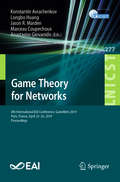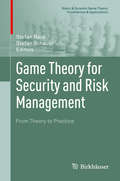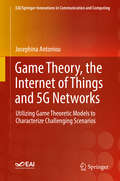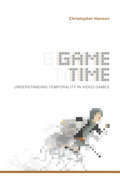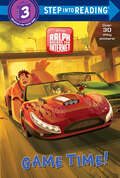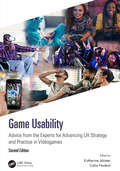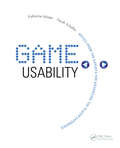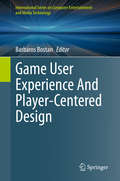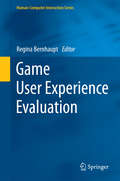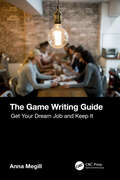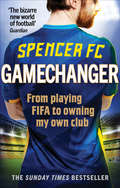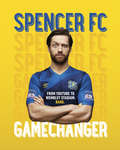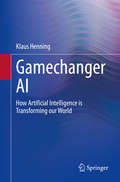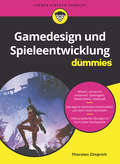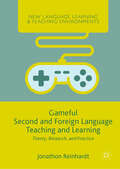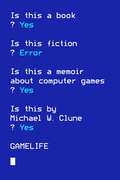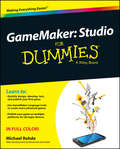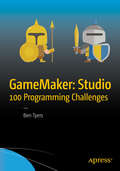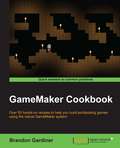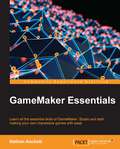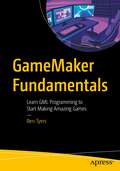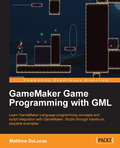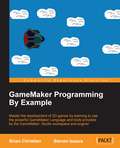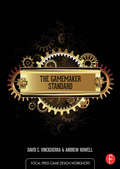- Table View
- List View
Game Theory for Networks: 8th International EAI Conference, GameNets 2019, Paris, France, April 25–26, 2019, Proceedings (Lecture Notes of the Institute for Computer Sciences, Social Informatics and Telecommunications Engineering #277)
by Konstantin Avrachenkov Longbo Huang Jason R. Marden Marceau Coupechoux Anastasios GiovanidisThis book constitutes the refereed proceedings of the 8th EAI International Conference on Game Theory for Networks, GameNets 2019, held in Paris, France, in April 2019. The 8 full and 3 short papers presented were carefully reviewed and selected from 17 submissions. They are organized in the following topical sections: Game Theory for Wireless Networks; Games for Economy and Resource Allocation; and Game Theory for Social Networks.
Game Theory for Security and Risk Management: From Theory to Practice (Static & Dynamic Game Theory: Foundations & Applications)
by Stefan Schauer Stefan RassThe chapters in this volume explore how various methods from game theory can be utilized to optimize security and risk-management strategies. Emphasizing the importance of connecting theory and practice, they detail the steps involved in selecting, adapting, and analyzing game-theoretic models in security engineering and provide case studies of successful implementations in different application domains. Practitioners who are not experts in game theory and are uncertain about incorporating it into their work will benefit from this resource, as well as researchers in applied mathematics and computer science interested in current developments and future directions.The first part of the book presents the theoretical basics, covering various different game-theoretic models related to and suitable for security engineering. The second part then shows how these models are adopted, implemented, and analyzed. Surveillance systems, interconnected networks, and power grids are among the different application areas discussed. Finally, in the third part, case studies from business and industry of successful applications of game-theoretic models are presented, and the range of applications discussed is expanded to include such areas as cloud computing, Internet of Things, and water utility networks.
Game Theory in Wireless and Communication Networks
by Zhu Han Dusit Niyato Walid Saad Tamer Başar Are HjørungnesThis unified treatment of game theory focuses on finding state-of-the-art solutions to issues surrounding the next generation of wireless and communications networks. Future networks will rely on autonomous and distributed architectures to improve the efficiency and flexibility of mobile applications, and game theory provides the ideal framework for designing efficient and robust distributed algorithms. This book enables readers to develop a solid understanding of game theory, its applications and its use as an effective tool for addressing wireless communication and networking problems. The key results and tools of game theory are covered, as are various real-world technologies including 3G networks, wireless LANs, sensor networks, dynamic spectrum access and cognitive networks. The book also covers a wide range of techniques for modeling, designing and analysing communication networks using game theory, as well as state-of-the-art distributed design techniques. This is an ideal resource for communications engineers, researchers, and graduate and undergraduate students.
Game Theory, the Internet of Things and 5G Networks: Utilizing Game Theoretic Models to Characterize Challenging Scenarios (EAI/Springer Innovations in Communication and Computing)
by Josephina AntoniouThis book shows how to model selected communication scenarios using game theory. The book helps researchers specifically dealing with scenarios motivated by the increasing use of the Internet of Things (IoT) and 5G Communications by using game theory to approach the study of such challenging scenarios. The author explains how game theory acts as a mathematical tool that models decision making in terms of strategies and mechanisms that can result in optimal payoffs for a number of interacting entities, offering often antagonistic behaviors. The book explores new technologies in terms of design, development and management from a theoretical perspective, using game theory to analyze strategic situations and demonstrate profitable behaviors of the cooperative entities. The book identifies and explores several significant applications/uses/situations that arise from the vast deployment of the IoT. The presentation of the technological scenarios is followed in each of the first four chapters by a step-by-step theoretical model often followed by equilibrium proof, and numerical simulation results, that are explained in a tutorial-like manner. The four chapters tackle challenging IoT and 5G related issues, including: new security threats that IoT brings, e.g. botnets, ad hoc vehicular networks and the need for trust in vehicular communications, content repetition by offloading traffic onto mobile users, as well as issues due to new wearable devices that enable data collection to become more intrusive.
Game Time: Understanding Temporality in Video Games (Digital Game Studies)
by Christopher HansonPreserving, pausing, slowing, rewinding, replaying, reactivating, reanimating. . . . Has the ability to manipulate video game timelines altered our cultural conceptions of time? Video game scholar Christopher Hanson argues that the mechanics of time in digital games have presented a new model for understanding time in contemporary culture, a concept he calls game time. Multivalent in nature, game time is characterized by apparent malleability, navigability, and possibility while simultaneously being highly restrictive and requiring replay and repetition. Hanson demonstrates that compared to analog tabletop games, sports, film, television, and other forms of media, the temporal structures of digital games provide unique opportunities to engage players with liveness, causality, potentiality, and lived experience that create new ways of experiencing time. Hanson's argument features comparative analysis of key video games titles including Braid, Quantum Break, Battle of the Bulge, Prince of Persia: The Sands of Time, Passage, The Legend of Zelda: The Ocarina of Time, Lifeline, and A Dark Room.
Game Time! (Step into Reading)
by RH DisneyA Step 3 deluxe Step into Reading leveled reader is based on the new Disney Ralph Breaks the Internet: Wreck-It Ralph 2!Walt Disney Animation Studios' follow-up to 2012's Wreck-It Ralph leaves the arcade behind, venturing into the expansive universe of the internet--which may or may not survive Ralph's not-so-light touch. Produced by Oscar® winner Clark Spencer, Ralph Breaks the Internet: Wreck-It Ralph 2 hits theaters on November 21, 2018! This Step 3 Step into Reading leveled reader with stickers is based on the upcoming feature film. It's perfect for children ages 5 to 7! Step 3 readers feature engaging characters in easy-to-follow plots about popular topics. For children who are ready to read on their own.
Game Usability: Advice from the Experts for Advancing UX Strategy and Practice in Videogames
by Katherine Isbister Celia HodentThis book introduces the basics in game usability and overall game UX mindset and techniques, as well as looking at current industry best practices and trends. Fully updated for its second edition, it includes practical advice on how to include usability in already tight development timelines, and how to advocate for UX and communicate results to higher-ups effectively. The book begins with an introduction to UX strategy considerations for games, and to UX design, before moving on to cover core user research and usability techniques as well as how to fit UX practices into the business process. It provides considerations of player differences and offers strategies for inclusion as well as chapters that give platform and context specific advice. With a wealth of new interviews with industry leaders and contributions from the very best in game UX, the book also includes brand new chapters on: Accessibility Mobile Game Usability Data Science Virtual and Augmented Reality Esports This book will be vital reading for all professional game developers and game UX advocates, as well as those students aspiring to work in game development and game UX.
Game Usability: Advancing the Player Experience
by Katherine Isbister Noah SchafferComputers used to be for geeks. And geeks were fine with dealing with a difficult and finicky interface--they liked this--it was even a sort of badge of honor (e.g. the Unix geeks). But making the interface really intuitive and useful--think about the first Macintosh computers--took computers far far beyond the geek crowd. The Mac made HCI (human c
Game User Experience And Player-Centered Design (International Series on Computer Entertainment and Media Technology)
by Barbaros BostanThis book provides an introduction and overview of the rapidly evolving topic of game user experience, presenting the new perspectives employed by researchers and the industry, and highlighting the recent empirical findings that illustrate the nature of it. The first section deals with cognition and player psychology, the second section includes new research on modeling and measuring player experience, the third section focuses on the impact of game user experience on game design processes and game development cycles, the fourth section presents player experience case studies on contemporary computer games, and the final section demonstrates the evolution of game user experience in the new era of VR and AR.The book is suitable for students and professionals with different disciplinary backgrounds such as computer science, game design, software engineering, psychology, interactive media, and many others.
Game User Experience Evaluation
by Regina BernhauptEvaluating interactive systems for their user experience (UX) is a standard approach in industry and research today. This book explores the areas of game design and development and Human Computer Interaction (HCI) as ways to understand the various contributing aspects of the overall gaming experience. Fully updated, extended and revised this book is based upon the original publication Evaluating User Experience in Games, and provides updated methods and approaches ranging from user- orientated methods to game specific approaches. New and emerging methods and areas explored include physiologically- orientated UX evaluation, user behaviour, telemetry based methods and social play as effective evaluation techniques for gaming design and evolving user-experience. Game User Experience Evaluation allows researchers, PhD students as well as game designers and developers to get an overview on available methods for all stages of the development life cycle.
The Game Writing Guide: Get Your Dream Job and Keep It
by Anna MegillThis comprehensive guide walks readers through the entire process of getting and keeping a writing job in the games industry. It outlines exactly what a beginner needs to know about education requirements, finding opportunities, applying for roles, and acing studio interviews. Professional writers will learn how to navigate studio hierarchies, transfer roles and companies, work overseas, and keep developing their careers. Written by an experienced games writer with nearly two decades of industry knowledge, this book contains a wealth of interviews and perspectives with industry leaders, hiring managers, and developers from marginalized communities, all offering their tips and insights. Included are examples of materials such as job posts, writing samples, and portfolios, as well as chapter-end challenges for readers to directly apply the skills they have learnt. This book will be of great interest to all beginner and aspiring games writers and narrative designers, as well as more experienced writers looking to hone their skills.
Gamechanger
by Spencer FCHow one man went from gaming and making videos at home to becoming a football club owner'The bizarre new world of football' Guardian I lifted the trophy triumphantly over my head, just as I’d seen so many FA Cup, World Cup and Champions League winners do on TV. It was quite simply the best moment of my life. Hashtag United had won. So, how on earth did this happen? How did a kid who at one point couldn’t even get in his school team end up playing at Wembley Stadium in front of 20,000 people? How did someone who spent his life playing computer games get to play football in the same side as World Cup- and Champions League-winning players?I'm hardly sure myself. But here's my attempt to tell the story.
Gamechanger: From playing FIFA to owning my own club
by Spencer FCBe on the ball with this game-changing footy favouriteAlright, mate, how’s it going? Believe it or not, I haven’t always been football mad. But then FIFA: Road to World Cup 98 came out. FIFA inevitably led to Football Manager. And that’s where I started getting properly hooked.Now I’m a football club owner who’s played to 20,000 people at Wembley Stadium and travelled the world with my team, Hashtag United. And the best bit of all? I’m not even that good.So, how on earth did this happen? How did someone who spent his life playing computer games and making YouTube videos pull it off?I’m hardly sure myself, but here’s my attempt to tell the story.
Gamechanger AI: How Artificial Intelligence is Transforming our World
by Klaus HenningArtificial intelligence changes everything. This book encourages readers to consider the challenges of the digital transformation driven by Artificial Intelligence. The reader will discover why this transformation is to be regarded as the greatest cultural revolution since the invention of mass printing and how it can be shaped positively in a value-oriented way. The author pursues the thesis that intelligent objects on the internet, as well as physical objects, are attaining their own consciousness. Using many examples, he shows how these digital companions become our digital partners. This non-fiction book provides many suggestions for one's own living and working environment and is full of examples of how artificial intelligence systems can be implemented. The reader learns what is already possible today and what can be expected in the next ten to twenty years. The book is of interest to anyone interested in AI and the digital transformation - from those responsible in companies, public institutions, and in politics, to all teachers and parents who want to understand what the next generation can expect.
Gamedesign und Spieleentwicklung für Dummies (Für Dummies)
by Thorsten ZimprichSie wollten schon immer Ihre eigene Spielidee umsetzen? Gamedesign ist Ihr Traumberuf? Dieses Buch zeigt Ihnen, wie Sie eigenen Spielcharakteren Leben einhauchen und Spieler mit originellen Spielregeln lange begeistern. Das ganze Buch ist als Lernkampagne mit zahlreichen Questen und Boss Challenges organisiert: Sie lesen, lernen und üben spielend in der Charakterklasse "Gamedesigner" und erhalten Erfahrungspunkte und Belohnungen. Nutzen Sie die Liste der zu erlernenden Fähigkeiten und Entwicklungsmöglichkeiten sowie zahlreiche Übungen, um selbstbestimmt mit Spaß zu lernen.
Gameful Second and Foreign Language Teaching and Learning: Theory, Research, and Practice (New Language Learning and Teaching Environments)
by Jonathon ReinhardtThis book offers a comprehensive examination of the theory, research, and practice of the use of digital games in second and foreign language teaching and learning (L2TL). It explores how to harness the enthusiasm, engagement, and motivation that digital gaming can inspire by adopting a gameful L2TL approach that encompasses game-enhanced, game-informed, and game-based practice. The first part of the book situates gameful L2TL in the global practices of informal learnful L2 gaming and in the theories of play and games which are then applied throughout the discussion of gameful L2TL practice that follows. This includes analysis of practices of digital game-enhanced L2TL design (the use of vernacular, commercial games), game-informed L2TL design (gamification and the general application of gameful principles to L2 pedagogy), and game-based L2TL design (the creation of digital games purposed for L2 learning). Designed as a guide for researchers and teachers, the book also offers fresh insights for scholars of applied linguistics, second language acquisition, L2 pedagogy, computer-assisted language learning (CALL), game studies, and game design that will open pathways to future developments in the field.
Gamelife: A Memoir
by Michael W. Clune<p>You have been awakened. <p>Floppy disk inserted, computer turned on, a whirring, and then this sentence, followed by a blinking cursor. So begins Suspended, the first computer game to obsess seven-year-old Michael, to worm into his head and change his sense of reality. Thirty years later he will write: "Computer games have taught me the things you can't learn from people." <p>Gamelife is the memoir of a childhood transformed by technology. Afternoons spent gazing at pixelated maps and mazes train Michael's eyes for the uncanny side of 1980s suburban Illinois. A game about pirates yields clues to the drama of cafeteria politics and locker-room hazing. And in the year of his parents' divorce, a spaceflight simulator opens a hole in reality. <p>In telling the story of his youth through seven computer games, Michael W. Clune captures the part of childhood we live alone.</p>
GameMaker
by Michael RohdeGet gaming faster with the official guide to GameMaker:Studio GameMaker: Studio allows you to create your own games, even withzero coding experience, and GameMaker: Studio For Dummies isa complete guide to the ins and outs of the program. Create thegame you've always wanted to play in record time and at a fractionof the cost of traditional game development methods. You'll havethe flexibility to develop 2D games for Android, iOS, desktops, andthe Web. Gain a professional perspective on this revolutionary pathto game creation and publishing.Using GameMaker: Studio may feel like play, but it's a serioustool that allows you to create, design, develop, and publish yourvery own games. With the push of a button, the program producesreal, executable code for your very own "app store"-ready 2D game,complete and ready for market. GameMaker: Studio For Dummiesprovides complete and accurate information on how to create classicgames and special effects, written in the characteristicallyeasy-to-read Dummies style. Topics include:An overview of Studio, and how to get startedThe basic tools and techniques at the core of your designAdvanced techniques for more seasoned game designersAn inside look at what the premium upgrades have to offerGameMaker: Studio makes game design 80% faster than coding fornative languages, so you can take your game from concept to marketin a matter of weeks. Why waste time and money doing it any otherway? Whether you already have great ideas or just want to dabble,GameMaker: Studio For Dummies is the guide that will takeyou straight to guru status.
GameMaker: Studio 100 Programming Challenges
by Ben TyersPush your GameMaker programming skills to the edge with 100 programming challenges using the popular GameMaker: Studio and GML. Each challenge includes an outline of the challenge, a scoring and time guide, useful GML code, and a working example provided in GMZ format. For more advanced programmers, each challenge comes with an additional task to complete. Think you're a good GameMaker game application developer or programmer? Think again with this awesome book! What You'll Learn Upgrade your skills with each specific game application coding challenge Create many different game events, action or scenarios Code for many different kinds of game applications or themes from space to adventure to sports to fantasy Who This Book Is For GameMaker and GameMaker: Studio users and coders.
GameMaker Cookbook
by Brandon GardinerOver 50 hands-on recipes to help you build exhilarating games using the robust GameMaker system About This Book * Design and develop game elements that can be used alone or stacked to enhance your gaming experience * Explore extensions that can unlock GameMaker: Studio's true potential to create complex games * A recipe-based, easy-to-follow guide to take your GameMaker skills to the next level Who This Book Is For This book is intended for GameMaker: Studio enthusiasts who are looking to add more substance and improve their content. If know your way around the program and have some basic GML skills but want to take them further, then this book is for you. What You Will Learn * Set up player control schemes of various types, such as touch controls and a gamepad * Create your own physics sandbox * Get accustomed to advanced player movement * Implement music and 3D sound in your games * Utilize GameMaker's GUI layers to create exciting games * Generate adjustable game settings and save systems * Add depth to your game with lighting and special effects In Detail GameMaker: Studio started off as a tool capable of creating simple games using a drag-and-drop interface. Since then, it has grown to become a powerful instrument to make release-ready games for PC, Mac, mobile devices, and even current-gen consoles. GameMaker is designed to allow its users to develop games without having to learn any of the complex programming languages such as C++ or Java. It also allows redistribution across multiple platforms. This book teaches you to harness GameMaker: Studio's full potential and take your game development to new heights. It begins by covering the basics and lays a solid foundation for advanced GameMaker concepts. Moving on, it covers topics such as controls, physics, and advanced movement, employing a strategic approach to the learning curve. The book concludes by providing insights into complex concepts such as the GUI, menus, save system, lighting, particles, and VFX. By the end of the book, you will be able to design games using GameMaker: Studio and implement the same techniques in other games you intend to design. Style and approach A problem-solving guide that teaches you the construction of game elements and mechanics to be integrated in games for rapid prototyping. Each overall topic includes several individual recipes taught through step-by-step instructions, and in-depth follow-up with examples.
GameMaker Essentials
by Nathan AuckettThis book is for users experienced with game development who now want to learn how to develop games in GameMaker: Studio in a fast-paced way.
GameMaker Fundamentals: Learn GML Programming to Start Making Amazing Games
by Ben TyersMaster the fundamental programming skills needed to create your own computer games in GameMaker. This book shows how to use GameMaker to build and publish cross-platform games. Each chapter covers a certain programming element, including layers, variables, and so on. You will also learn how to design levels in your games, draw sprites to populate your virtual worlds, and build GUIs for your menus and game interfaces. GameMaker Fundamentals also provides a thorough introduction to the GameMaker Language (GML). Practical example projects reinforce the concept discussed in each chapter. On completing this book, you will have a thorough understanding of how to create games from scratch using game design and programming principles using GameMaker and GML. What You Will LearnReview core programming features required for sound knowledge of GameMakerMaster how to combine GML to orchestrate game actionsUtilize GameMaker's layers to create exciting gamesSet up player controlWho Is This Book ForThose new to GameMaker or game programming in general; it assumes no prior knowledge or skill set.
GameMaker Game Programming with GML
by Matthew DelucasA step-by-step approach to build your knowledge, starting from a simple "hello world" to discovering arrays, classes, and so on. Each learning point is explained in a practical way, carrying out tasks within the GameMaker development environment. If you are a GameMaker Studio developer who has little experience with writing scripts and want to expand that skill set, this is the book for you. It is assumed that you can already navigate GameMaker Studio to some degree. This book will primarily focus on scripting and the integration of scripts to aid in the production of a game and not actual game design. It is highly recommended that you have access to (or the ability to) create visual and audio assets for the examples presented.
GameMaker Programming By Example
by Steven Isaacs Brian ChristianMaster the development of 2D games by learning to use the powerful GameMaker Language and tools provided by the GameMaker: Studio workspace and engine! About This Book * Rapidly develop games using the powerful yet easy easy-to to-use GameMaker: Studio engine * Comprehensive: This is a comprehensive guide to help you learn and implement GameMaker's features. * Go through step-by-step tutorials to design and develop unique games Who This Book Is For If you have at least some basic programming experience of JavaScript or any other C-like languages, then this book will be great for you. No experience beyond that is assumed. If you have no game development experience and are looking for a hobby, are an experienced game developer looking to master some advanced features, or fit anywhere in that spectrum, then you will find GameMaker: Studio and this book to be very useful in helping you create exciting games. What You Will Learn * Understand the GameMaker: Studio interface and tools to quickly create the various assets used in your games * Translate some of the GameMaker: Studio drag and drop functions to the GameMaker language * Create games with random elements for exciting gameplay * Use the basic GameMaker file I/O and encryption systems * Utilize the GameMaker networking functions to create multiplayer games * Give AI routines to your enemies to make challenging gameplay * Create particle systems to give your game exciting graphics * Understand the various debugging techniques available in GameMaker: Studio In Detail This book is excellent resource for developers with any level of experience of GameMaker. At the start, we'll provide an overview of the basic use of GameMaker: Studio, and show you how to set up a basic game where you handle input and collisions in a top-down perspective game. We continue on to showcase its more advanced features via six different example projects. The first example game demonstrates platforming with file I/O, followed by animation, views, and multiplayer networking. The next game illustrates AI and particle systems, while the final one will get you started with the built-in Box2D physics engine. By the end of this book, you have mastered lots of powerful techniques that can be utilized in various 2D games. Style and approach A This step-by-step guide that follows and with details ons different topics throughout the creation of various examples.
The GameMaker Standard (Focal Press Game Design Workshops)
by David Vinciguerra Andrew HowellThis book teaches students and entry-level novices how to create games using the GameMaker engine. Readers will quickly hone their design skills with tutorials that are written so that beginners can quickly start building games while also providing lessons on how designers can 'level up' and add advanced options to their games. Readers will also have access to a website containing all the assets and resources to create their games, including sprites and animations, walk-through video tutorials of each lesson and music composed by professional musicians. Also provided are rubrics for instructors to use when grading student work or for readers learning on their own to evaluate their own work.
